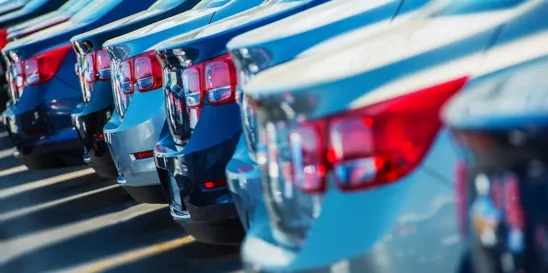This update helps automotive suppliers inform their legal and operational decisions to help address challenges and opportunities.
Key Developments
- Labor negotiations between the UAW and Detroit Three automakers concluded following the ratification of contracts by a narrow margin at GM, and by wider margins at Ford and Stellantis.
- Higher wages for autoworkers resulting from new labor contracts could impede efforts to sell EVs at more affordable price points, according to a report in Bloomberg.
- The percentage of consumers considering an EV purchase declined, and high selling prices are a key market barrier, according to analysis from S&P Global Mobility featured in The Wall Street Journal.
- Wood Mackenzie predicts combined sales of battery EVs, plug-in hybrids and a small number of fuel cell EVs will represent approximately 10% of U.S. new vehicle sales in 2023, rising to 52% by 2032. The analysis notes that while U.S. EV production surpassed consumer demand this year, vehicle electrification is expected to remain the long-term trend. Two key market headwinds to EV growth in the near-term are high vehicle prices and the outcome of the 2024 U.S. presidential election.
- The U.S. auto industry could be impacted by shifts in policies for immigration, trade, and vehicle electrification following the outcome of next year’s presidential election, according to a report in Automotive News.
- Nikkei Asia reports certain South Korean battery makers are reducing workforces and revising production targets in the U.S. amid a slowdown in the transition to EVs.
- The U.S. Department of Energy announced up to $3.5 billion in funding from the 2021 infrastructure law toward domestic battery and battery material manufacturing. The funds will be granted to projects focused on battery-grade processed critical minerals, battery precursor materials, battery components, and cell and pack manufacturing.
- UAW members ratified a five-year collective bargaining agreement with Mack Trucks which covers approximately 3,900 employees.
- Amazon will launch vehicle sales in the U.S. in 2024, and allow car dealers to sell directly to customers on its site beginning with the Hyundai brand.
- Voters in Maine approved a “right to repair” proposal allowing independent repair shops access to the same data as car dealerships. In response, the Alliance for Automotive Innovation released this statement: “The legislature should examine this referendum in 2024 and consider legislation to codify the national cooperation agreement that already exists – and has worked well for a decade – between independent repairers and automakers.”
OEMs/Suppliers
- The Wall Street Journal reports auto exports from nations including China, South Korea, Japan and Germany have increased by double digits in recent months, in contrast to weakness non-auto exports.
- Stellantis will offer voluntary buyouts to approximately half of its U.S. salaried workforce due to “challenging market conditions” and the transition to EVs.
- Toyota, Honda, Hyundai and Nissan will raise salaries for production workers at U.S. facilities as a result of the UAW’s labor agreements with the Detroit Three automakers.
- Jeep production was temporarily halted on November 15 due to a UAW strike at a supplier in Ohio.
- The UAW is pursuing efforts to organize workers at Honda and Subaru, according to a report in The Wall Street Journal.
Electric Vehicles and Low Emissions Technology
- The redesigned 2025 Toyota Camry will only be offered as a hybrid vehicle. The automaker has offered a hybrid version of the Camry since 2007, and the vehicle has been the top-selling car in the U.S. for 22 consecutive years.
- Analysis from the U.S. Department of Energy estimates there have been 208 private sector and 27 federal investment announcements in American-made battery technologies as of September 2023, representing over $120 billion in funding.
- Exxon plans to supply enough lithium for the equivalent of 1 million electric vehicles annually by 2030, by extracting the metal from underground saltwater reservoirs in locations such as Arkansas.
- Honda will invest $15 million as part of its foundational partnership role in an upcoming Ohio State University battery cell research center.
- GM announced its BrightDrop commercial electric vehicle business will no longer operate as a subsidiary, and will instead be absorbed into the company.
- Strengthening EV charging infrastructure is among the key priorities for the new chief mobility officer for the state of Michigan, according to an interview in Crain’s Detroit.
- Volvo Group acquired the assets of the bankrupt electric bus and battery manufacturer Proterra for $210 million.
- Hyundai’s air mobility division, Supernal, plans to reveal an electric vertical take-off and landing craft (eVTOL) prototype at the CES in Las Vegas in January. The company intends to build eVTOLs at an unspecified U.S. location in the coming years.
- Colorado-based Forge Nano plans to establish a $165 million battery manufacturing plant in North Carolina by 2026.
- Minnesota-based Zeus Electric Chassis will partner with Michigan-based Edison Manufacturing and Engineering, Inc. to produce a battery-powered class 5 truck.
- Chinese smartphone company Xiaomi revealed details of its debut EV, which will be manufactured by state-owned Beijing Automotive Group.
Automated, Autonomous or Connected Vehicles Technologies
- The National Highway Traffic Safety Administration withdrew a proposed rule that would have required all new cars and light trucks to be equipped with vehicle-to-vehicle (V2V) communication systems, due to the emergence of new technologies such as cellular vehicle-to-everything (C-V2X).
- A group of U.S. House lawmakers submitted questions to 10 autonomous vehicle companies about whether data collected in the U.S. is shared with entities affiliated with China.
- The CEO of GM’s self-driving unit Cruise resigned on November 19. The action comes less than a month after Cruise halted its robotaxi operations across the U.S., following the decision by the California Department of Motor Vehicles to suspend the company’s operating permits due to safety concerns.
Market Trends and Regulatory
- A U.S. House panel is investigating a Federal Trade Commission proposal to expand certain disclosure requirements for automotive dealerships. The Center for Automotive Research estimates dealerships could face significant compliance costs if the Motor Vehicle Dealers Trade Regulation rule is enacted.
- Continuing to provide AM radio in new vehicles, including electric models, could cost automakers up to $3.8 billion dollars through 2030, according to a new report from the Center for Automotive Research.
- Proponents of hydrogen-powered heavy-duty trucks cite the potential for longer driving distances and faster recharging compared to battery-cell electric trucks, while noting the technology is in the nascent stages of development.
- The National Transportation Safety Board is recommending that automakers install intelligent speed assistance technology and countermeasures in all new cars and trucks following an investigation into a multi-vehicle crash last year in suburban Las Vegas that led to nine fatalities.






 />i
/>i

